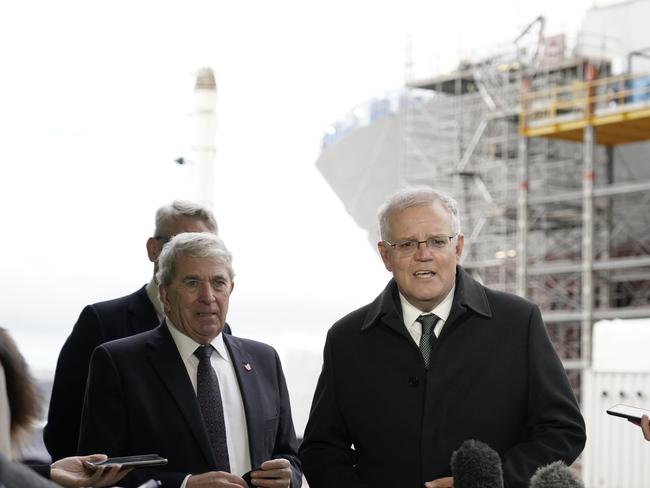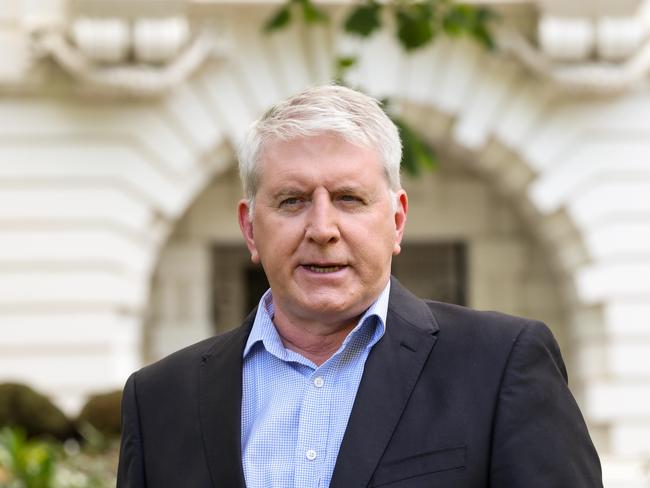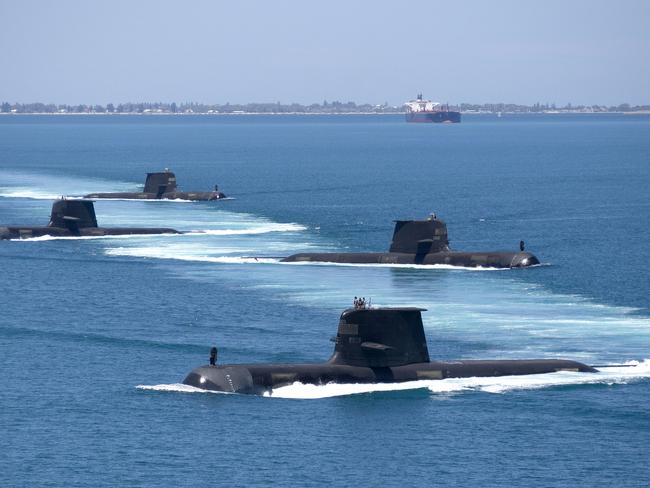Federal Election 2022: China, defence spending top of Scott Morrison’s agenda
Australians need a government that can be trusted on national security and defence. This is what each party is promising and why China will change how we vote at the polls.
Federal Election
Don't miss out on the headlines from Federal Election. Followed categories will be added to My News.
For the first time since the Cold War ended 30 years ago, Australians will this year go to an election with a government keen to show that only it can be trusted on national security and defence.
In contrast the Labor Party will spend the next few weeks seeking to downplay any differences between the two sides.
The political strategies of the two sides could not be more starkly different.
The Government, keen to claim the high-ground in an area has grown massively in importance since China’s Xi Jinping’s began sabre rattling a decade ago, is keen for Australians to compare its current record defence spending with Labor’s record of cuts when it was in office between 2007 and 2013.

The Opposition on the other hand is keen to stress that little will change if it comes to power in May, to areas where the party shares common ground with the government, starting with its long-term support for the US alliance to its endorsement last year of the AUKUS agreement that will see Australia acquire nuclear powered subs.
Labor is also keen to stress it has also backed the revival of the Quad dialogue between Australia, India, Japan the USA as well as increased defence spending and most recently the lethal aid we have offered to Ukraine as it battles its Russian invader.
Unsurprisingly, Defence Minister Peter Dutton says in reality “Labor never takes defence seriously – they’ve always got other priorities”.
“The Indo-Pacific is more and more uncertain and what we are seeing in Europe shows there will be a period of uncertainty for the next decade and beyond,” he said.
“The Government has taken a number of decisions to prepare Australia and to deter any adversity.”

In contrast when Labor was in government “they didn’t order any ships or subs”.
Dutton points out that defence spending as a share of GDP dropped to 1.56 per cent in the 2012-13 Budget – the lowest level of funding since 1938 – and immediately following its 2009 White Paper, Labor cut or deferred more than $16 billion from the defence budget.
“Had spending continued on that trajectory we would have had $55 billion dollars less in aggregate spent in defence and on acquisition over the course of the last several years and we would be facing a budget today with a three in front of it instead of a four,” he said.
Unsurprisingly, Dutton’s opposite number Brendan O’Connor, rejects the charge that Labor was weak on defence when it was in office.
“No one denies there’s more spending now as there should be and we’ve supported increased spending since 2013,” he said.
“But the facts are whether you look at the Howard Government or the Rudd-Gillard Governments the annual average expenditure was between 1.7 per cent and 1.8 per cent of GDP.”
There was a time, he pointed out, when John Howard was introducing the Chinese premier to the Parliament.
“Labor agrees that China’s behaviour has fundamentally changed and that’s why we support the government’s response whether it is in AUKUS or the Quad,” he said.

Independent experts disagree on how much difference there is between the two sides.
Veteran defence analyst Alan Dupont believes despite the name calling there’s not much difference between them.
“There’s some difference in rhetoric but very little difference in substance,” he said.
“I think Labor have probably been a little bit more cautious on criticising China – and they’ve also been critical of aggravating problems with china – but otherwise Albanese has been at pains to announce there’s no real difference between them.”
John Blaxland, the Professor of International Security and Intelligence Studies at ANU agrees.
“I don’t think the differences are that great to be honest,” he said.
“When you look back to the 1990s when John Howard came to office, one of the first things he did was cut defence when he cancelled the ready reserve scheme.”
Blaxland says there is no doubt defence spending as a percentage of GDP reached a low-point under the last Labor Government but the dollar terms were still substantial because the economy was much bigger.

“It’s easy to cast aspersions about Labor’s handling of defence matters in the early 2010s particularly the funding of the 2009 and the 2013 defence white papers but it’s important to remember the context – it was pre-Trump the unipolar world hadn’t quite had its sunset and we hadn’t seen Xi Jinping’s wolf warrior diplomacy,” he said.
In contrast, although Peter Dean, chair of defence studies at the University of Western Australia, thinks “here’s no doubt the government wants to run a sort of khaki election” the differences between the two are mainly differences of emphasis.
“Morrison is very focused on the China threat and what he calls the axis of autocracy [whereas] Albanese, if you go by his Lowy speech, he put climate in a national security context as does the Biden Administration.”
The Opposition leader, he says, is more focused on national resilience, national sovereignty and national unity.
“He’s taking a broader more holistic emphasis on national security,” he said
“It’s a difference in emphasis based on different political views and where they see different political advantages.”
MAJOR PARTY ELECTION POLICIES
LABOR
Will order the first Posture Review since 2012 to consider ADF units, assets, and facilities are prepared to take action in a timely way.
Wants to beef-up firepower on existing defence platforms to fill short term gaps until new frigates and subs arrive including potentially adding tomahawk missiles to Collin Class submarines, upgraded weapons on the Arafura Class offshore patrol vessels and additional Hobart Class Air Warfare Destroyers
Plans to undertake an Urgent Climate Risk Assessment – to examine climate change as a major threat multiplier and the increasing need for the ADF to play on natural disaster response in Australia and the region.
Opposes privatisation in defence and veterans affairs
COALITION
The Government is running on its record in increased defence spending since 2013 with Labor’s record between 20017 and 2013 which included cutting or deferring over $18 billion of expenditure and failing to commission the build of one naval vessel in an Australian yard.
More than $270 billion in new investment over the next decade that has seen spending rise above 2 per cent of GDP.
The biggest upgrade of the Royal Australian Navy since WWII including building nine Hunter class frigates, major upgrades to the Navy’s three Hobart class destroyers and full-cycle docking of six Collins class submarines.
Plans to build Australia’s future fleet of eight nuclear-powered submarines at Osborne in South Australia
Maintaining temporary protection visas as a pillar of Operation Sovereign Borders, which Labor plans to scrap.
ANALYSIS – JAMES CAMPBELL
Like most areas of government, there are things that each side of politics wants to talk about in defence and national security and things they would rather avoid.
For Labor, the spending cuts in the Rudd Gillard era are acutely embarrassing. Kevin Rudd’s 2009 defence white paper – written largely by the current Home Affairs boss Mike Pezzullo – was the first to flag the danger of a rising China.
But the government failed to follow through with the spending needed to meet the threat. Worse, under Julia Gillard – whose 2013 white paper downplayed the Chinese threat – spending was cut.
Naturally the government is keen to talk about this in the context of what Labor might do if it gets back in this year.
Labor argues that this was a different time and that it has backed all the defence spending that has happened since then, most recently, last year’s decision to acquire nuclear powered submarines through the new AUKUS arrangement with the US and UK.
That deal involved dumping the contract to buy diesel subs from the French which defence expert Peter describes as “probably the biggest procurement fiasco in our history,” which is why Labor is happy to talk about it, along with the growing evidence the Hunter class frigate program may also be in trouble following a secret report leaked to the Australian which warned the ships could be substantially slower, have a shorter range than originally intended, and vulnerable to detection by enemy vessels.
Labor is also happy to talk about the need to acquire extra fire power on our existing platforms while we wait for the arrival of the nuclear subs which are at least a decade away, something the government says is already in hand.





